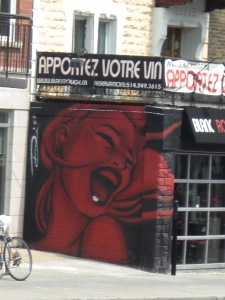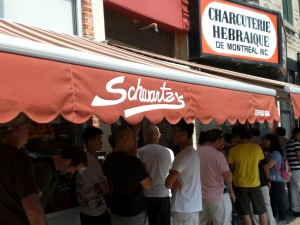While at McGill, my editor at the McGill Daily, Jason Chow, a first-generation Chinese-Canadian from Medicine Hat, Alberta, had a favorite go-to phrase to sum up Canadians and Americans – “Canadians will never get the race issue in the States and Americans will never get the French issue here.” Very possibly true. Though I suspect that most Americans haven’t given nearly the same amount of thought to the “Canadian problem,” as Canadians (and you know, the whole world) have given to America’s legacy of slavery and racism. Most Americans today probably just have a vague notion that somewhere in Canada people speak French and that it’s been an issue, maybe a serious one. (Americans in the 1960’s and 1970’s almost definitely had a clear idea of the issue, especially after the kidnapping and murder of Quebec Labor Minister, Pierre Laporte in 1970, by the FLQ, the Front de Liberation du Quebec, and several other bombings by them, including of the Montreal Stock Exchange).
Those “issues” led to the steep decline of one of the greatest, wealthiest cities in North America. It is hard to think of another city that faded and changed so dramatically because of cultural tensions, rather than say, an industry collapsing or the ravages of war. But it also gave birth to a newer, Frencher, Montreal, that has more or less risen from the ashes of the worst of it and has recreated itself as the young, creative, and charming town that it is today. Let Toronto and New York carry the self-important burden of being too expensive and overworked. Montreal sort of has it figured out.

But it has only figured it out pretty recently. In 1996, just after the province of Quebec voted not quite overwhelmingly to stay part of Canada, Montreal was not doing so well; it felt empty and each new A Louer (For Rent) sign in a newly-vacant storefront relentlessly reminded you of that. The mass exodus of Anglos – Jewish and Protestant – and their money, left a very palpable absence in the city. But the ultimate victory of Francophone Quebec was not a totally pyrrhic one – Quebec eventually, after a couple of centuries of wishful resistance, reclaimed its main city — poorer and smaller, but French and seemingly finally comfortable and less anxious as a French island in an English sea.
Hugh MacLennan’s Two Solitudes
Two Solitudes, a main contender for The Great Canadian Novel, was Hugh MacLennan’s beautiful and poignant parable from 1945, about French and English Canada. It begins with the First World War, which to many in the Commonwealth was the British Empire’s Original Sin –Canada, Australia and New Zealand will never forget all the young boys they sacrificed for England in that war. For obvious reasons the war also sowed even deeper resentment towards English Canada among the Quebecois – why should they fight England’s war at all? In this epic story, Athanase Tallard, the scion of a wealthy landed family from St. Marc, a small town a few hours from Montreal, struggles with this and ends up alienating himself from both communities by trying to embrace the modern, practical English way of doing business while also advocating on behalf of the French. He battles with the most powerful force in St. Marc, the Catholic Church, which encouraged its parishioners to hold on to their bitter memories and use them to fuel hatred and resistance towards the English. His own son, a draft dodger opposed to Quebecois conscription, cultivates his personal resentment towards his father into a rabid blind nationalism and preaches his vitriol at whatever pulpit is given him. The other Solitude in the meanwhile, described as comparatively staid and bloodless, busy counting its money on St. James Street, exploiting French Canadians and hosting debutante balls, also contends with its own less than settled identity in the Canadian colony.
The characters are very much archetypes but are also subtley and beautifully infused with real life, especially the main heroes of the book – an Anglophone girl, raised properly in the Golden Square Mile, but dissatisfied with the older generation’s expectations of her to become a complacent over-educated house wife; and a boy half Irish half French, Athanase Tallard’s other son, similarly uncomfortable in a world that neither accepts him as French or English. Together they forge a path toward the new Canada with its New World identity, fresh resourcefulness and final, painful uprooting from its European past.
“Two Solitudes,” although not coined by MacLennan, was the byword in Canada for the English/French problem and Canadian Society and his book helped define it. Cultural progress often seems to be measured in relation to it. In her investiture speech as the new Governor General of Canada, in 2005, Michaelle Jean, a Haitian refugee who moved to Quebec in 1968 and who made her mark as an accomplished journalist and statewoman, stated that, “the time of the Two Solitudes that for too long described the character of this country is past.”
Mordecai Richler & The Jews
Quebec’s irascible prodigal son – Mordecai Richler – may have been a very annoying Jewish thorn in the side of the Quebecois during his lifetime, often accused of Anglo 5th Column sensibilities. But Richler loved Quebec, his birthplace and chosen home after many years of the expat British experience that so many Canadian writers ran to before returning to embrace their (finally) first-rate, world-class, home. Richler’s novels help chronicle the rich Jewish life in Montreal. When Montreal wasn’t busy being rich and WASPy, it spent its time being poor and Catholic or Jewish (and not just French Catholic, Montreal was significantly Irish as well), or at least the stereotype goes.**
In the tradition of Philip Roth (early Philip Roth), Richler is a master at portraying the messy, yiddisher Jewish world of his post-WWII Montreal. His was a sooty, crowded, smelly, working class Jewish shtetl in and around The Main (St. Laurent Boulevard), of which some remnants remain, such as Schwartz’s and Berson & Sons’ 4th generation tombstone business across the street. After New York, Montreal very possibly boasted the most culturally rich Jewish community in North America. One outpost has even made it to Brooklyn, at Mile End on Hoyt St. (though Mile End seems to be a Quebec catchall, as they proudly advertise their poutine).
It’s a bit puzzling why Richler is not more popular here, he is hilarious and so politically and culturally astute and deals with his Jewish identity issues in a non-cynical way (it is superficially cynical but scratch the surface just a bit and there is a lot of love, much like Richler himself) that I, at least, prefer to so many other Jewish writers of his generation (Or any Jewish writers of any generation that address Jewish identity in their work for that matter). Others seem to try and “get over” their Jewishness, have some resentment towards it, and so end up becoming utterly obsessed with it. (Richler’s view of his Jewishness seems to be– “It is what it is.”). He has no problem airing some Jewish dirty laundry, and picking apart Montreal’s Jewish middle class, who often looked down on his kind, and he certainly broke free of his elders’ religious superstitious shtetl mentality. But he writes with affection for both, even when in Son of a Smaller Hero, his mother keeps feigning a heart condition to keep him from marrying a shiksa (Actually in Two Solitudes, the main matriarchal character also feigns a heart condition to oppose a marriage – good to see the commonalities between the two cultures, really heartwarming).

Son of a Smaller Hero, since it was only Richler’s second novel, also serves as a great primer to Montreal of that time. Richler did not take for granted that his audience knew him or Montreal as thoroughly as he, and his descriptions of that city and that time are priceless:
“Every night, St. Lawrence Boulevard is lit up like neon cake and used-up men stumble out of hundred different flophouses to mix with rabbinical students and pimps and Trotskyites and poolroom sharks. Hair tonic and water is consumed in back alleys. Swank whores sally at you out of the promised jubilee of all the penny arcades. Crap games flourish under lampposts.”
In another chapter, Richler charts how the various groups mixed in cottage country:
“About fourty-five miles north of Montreal a side-road turns off into Ste. Adele en-haut. It’s about three miles to the lake. Ste. Adele is the retreat of Montreal’s aspiring middle-class, and, as a resort town, is prone to all the faults and virtues of that group. The cottages are clean but prosaic: no Jews are wanted, but, on the other hand, they are dealt with diplomatically. The French Canadians tolerate the Presbyterians from the city because they have brought prosperity to their village, and the Presbyterians find that the French Canadians add spice to their holiday: they accept their haughtiness as philosophically as rain on Sundays. Few on either side are bilingual.”
In Joshua, Then and Now, maybe his best novel, and most autobiographical, he explores all of these different types of Jews, and the non-Jews in their lives. Joshua, raised by a vain, neglectful mother who married down, and a professional boxer father whom he saw between bouts and some other vague work for a Mr. Collucci (and the resulting run from the law) Joshua schemes, outwits and writes his way to a successful career as a TV Sports Journalist. On his way there, he travels to Spain to indulge his obsession with the Civil War, mixes with the crowd in literary London and eventually marries the daughter of a dignified Ottawa Senator, with a cottage in the Laurentions where the evening cocktail hour brings out all the fancy Anglos in their boats and seaplanes.
If you are feeling too lazy to read through one of his books, you can check out the movies based on them (though I promise you will enjoy the books, he is so much fun, and you will probably learn a lot – I do at least). You can watch The Apprenticeship of Duddy Kravitz with Richard Dreyfuss and there is also an adaption of Joshua Then and Now with James Woods. Apparently there is a movie coming out soon based on Barney’s Version, his last novel, also pretty great and very very funny. I hear Paul Giamatti is playing the lead. Look out for it.

**To Richler, this was the myth French Canadians lived with:
(The) conviction that, even today, the quintessential Westmount man – a banker – is chauffeured each morning to his office on St. James Street, where, in need of a daily hee-haw, he will foreclose on an impecunious habitant and then hurry home to mount the ravishing but innocent Francophone maid, throwing her off the roof if she gets preggers. The women shop at Holt Renfrew and then repair to the neighboring Ritz-Carlton Hotel for drinks and, providing they are not hopelessly frigid, assignations as well. And once a year the Westmount men and women convene at the Ritz in their tribal finery for St. Andrew’s Ball, their champagne-laden tables attended by the white niggers of North America, Quebecois pure laine, whose parents live in an unheated East End flat, owned by a short fat Jewish slumlord, the mother suffering from consumption and the father bound to die without ever once wintering in Hollywood, Florida, a lifelong dream.
(This, from his book Oh Canada! Oh Quebec!, from the early 90’s, obviously did not endear him to many French Canadians, but he was always very democratic and generous with his insights and insults, no one was safe and everyone was at least mildly annoyed, except for the ones who thought it was really really funny).



